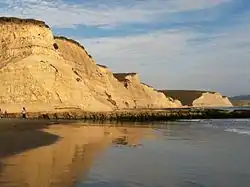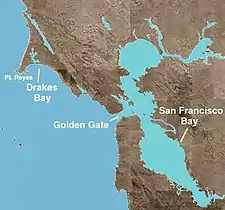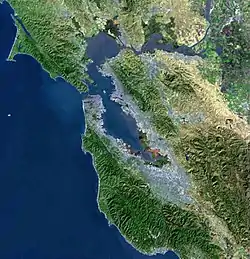Drakes Bay
Drakes Bay (Coast Miwok: Tamál-Húye) is a 4 mi (6 km) wide bay named so by U.S. surveyor George Davidson in 1875 along the Point Reyes National Seashore on the coast of northern California in the United States, approximately 30 mi (50 km) northwest of San Francisco at approximately 38 degrees north latitude.[2] The bay is approximately 8 mi (13 km) wide. It is formed on the lee side of the coastal current by Point Reyes. The bay is named after Sir Francis Drake[3] and has long been considered Drake's most likely landing spot[4] on the west coast of North America during his circumnavigation of the world by sea in 1579. An alternative name for this bay is Puerto De Los Reyes.[2]
Drakes Bay Historic Archaeological District | |
 2013 view | |
  | |
| Coordinates | 38°0′43″N 122°55′9″W |
|---|---|
| NRHP reference No. | 12001006[1] |
| Significant dates | |
| Added to NRHP | October 10, 2012 |
| Designated NHLD | October 10, 2012 |

The bay is fed by Drake's Estero, an expansive estuary on the Point Reyes peninsula. The estuary is protected by Estero de Limantour State Marine Reserve & Drakes Estero State Marine Conservation Area. Point Reyes State Marine Reserve & Point Reyes State Marine Conservation Area lie within Drakes Bay. Like underwater parks, these marine protected areas help conserve ocean wildlife and marine ecosystems.
A portion of the coastal area of Drakes Bay is archaeologically and historically important. It is believed to be the site of Francis Drake's 1579 landfall (which he called New Albion), and also the location where a Spanish Manila galleon sank during a storm in 1595. Both Drake and the Portuguese commander of the galleon, Sebastião Rodrigues Soromenho, interacted with the local Coast Miwok. There are fifteen archaeological sites on the bay of Miwok settlements where European trade goods have been found, including materials that the Miwok probably recovered from the wrecked galleon.[5] The region was designated a National Historic Landmark District on October 17, 2012.[6][7]
See also
References
- "Weekly List of Actions Taken on Properties: 10/22/12 through 10/27/12". National Register of Historic Places. National Park Service. Retrieved 2 November 2012.
- U.S. Geological Survey Geographic Names Information System: Drakes Bay
- Gannett, Henry (1905). The Origin of Certain Place Names in the United States. Govt. Print. Off. pp. 109.
- "Point Reyes National Seashore California". National Park Service. Retrieved 8 February 2015.
- "Drakes Bay National Historic Landmark Historic District". National Park Service. Retrieved 2018-01-16.
- Kovner, Guy (17 October 2012). "Drakes Bay at Point Reyes named national historic landmark". The Press Democrat. Retrieved 16 January 2014.
- "US Interior Dept. makes 4 Calif. sites landmarks". San Jose Mercury News. 17 October 2012. Retrieved 16 January 2014.
External links
- Again a safe harbor: Tiny cove many believe Sir Francis Drake repaired to 422 years ago suddenly reappears, San Francisco Chronicle, July 18, 2001
- Shifting sandbars match Drake's descriptions of landing site
- Francis Drake: The Naming of Drakes Bay
 Media related to Drakes Bay Historic and Archeological District at Wikimedia Commons
Media related to Drakes Bay Historic and Archeological District at Wikimedia Commons


